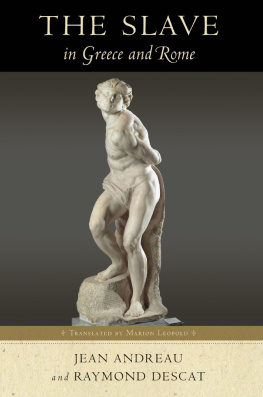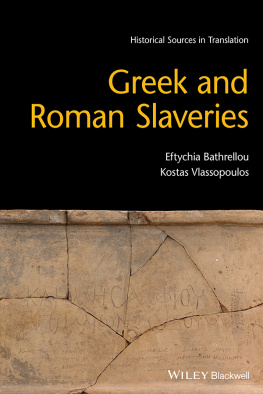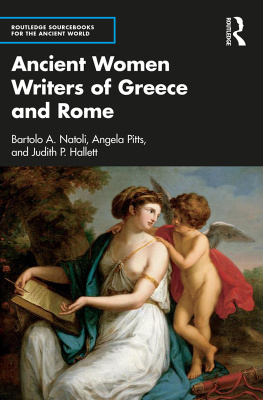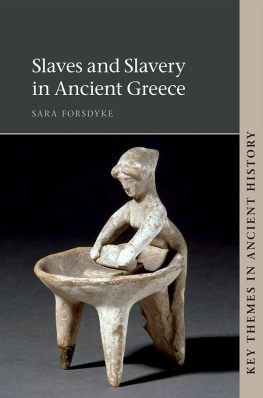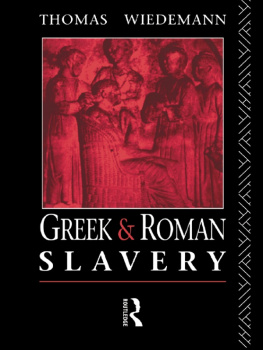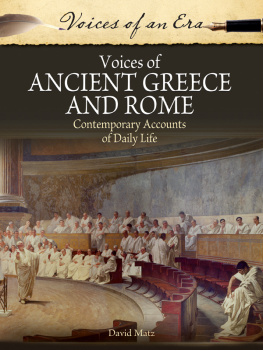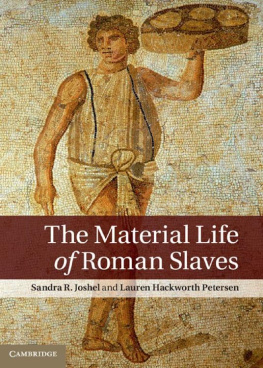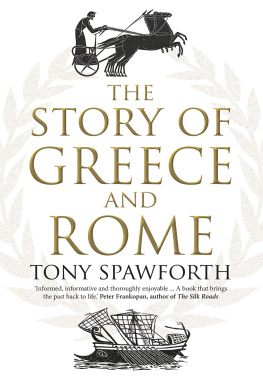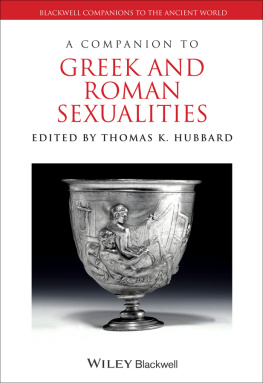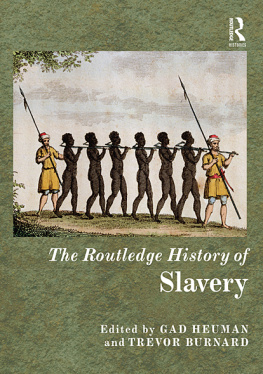Publication of this volume has been made possible, in part, through the generous support and enduring vision of WARREN G. MOON.
THE SLAVE IN GREECE AND ROME

JEAN ANDREAU AND RAYMOND DESCAT
TRANSLATED BY
MARION LEOPOLD
THE UNIVERSITY OF WISCONSIN PRESS
The University of Wisconsin Press
1930 Monroe Street, 3rd Floor
Madison, Wisconsin 53711-2059
uwpress.wisc.edu
3 Henrietta Street
London WCE 8LU, England
eurospanbookstore.com
Originally published in France as Esclave en Grce et Rome,
copyright 2006 by Hachette Littratures
Translation copyright 2011 by the Board of Regents of the University of Wisconsin System All rights reserved. No part of this publication may be reproduced, stored in a retrieval system, or transmitted, in any format or by any means, digital, electronic, mechanical, photocopying, recording, or otherwise, or conveyed via the internet or a website without written permission of the University of Wisconsin Press, except in the case of brief quotations embedded in critical articles and reviews.
Printed in the United States of America
Library of Congress Cataloging-in-Publication Data
Andreau, Jean.
[Esclave en Grce et Rome. English]
The slave in Greece and Rome / Jean Andreau and Raymond Descat;
translated by Marion Leopold.
p. cm. (Wisconsin studies in classics)
Originally published in 2006 in France as Esclave en Grce et Rome.
Includes bibliographical references and index.
ISBN 978-0-299-28374-2 (pbk. : alk. paper) ISBN 978-0-299-28373-5 (e-book)
1. SlavesGreeceSocial conditions. 2. SlavesRomeSocial conditions.
3. SlaveryGreeceHistory. 4. SlaveryRomeHistory. I. Descat, Raymond.
II. Leopold, Marion. III. Title. IV. Series: Wisconsin studies in classics.
HT863.A6313 2011
306.3 6209495dc23
2011018956
Contents
THE SLAVE IN GREECE AND ROME
Introduction
On February 4, 1794, the National Convention in France abolished slavery in the French Antilles. This was the first, short-lived episodeslavery was reinstated in 1802of an abolition which became irrevocable in 1848. Today abolition is a matter of fact, although it is widely estimated that worldwide some twenty million adults are still subjected to forms of statutory and traditional slavery.
In a recent book, M. Lengelle-Tardy writes that a poorly paid factory worker in an emerging economy, or an unemployed person without benefits who sleeps in the streets, is a slave in the same way as those of Greece and Rome or as black Americans before 1865. Although his indignation in the face of such destitution is certainly justified, it is important to reject this confusion between the slave, who is the legal property of someone else, and the person who is miserable but legally freea confusion that flouts all intellectual rigor.
These considerations demonstrate, nonetheless, the extent to which slavery, approximately one and a half centuries after its official disappearance, is thought to be a revolting, indeed an unbearable condition, and the extent to which it remains an issue today. To speak of slavery is to evoke unparalleled social callousness; we readily liken the most inhumane forms of social oppression to slavery.
Authentic historical slavery was, however, much more complex and varied than we imagineeven if, to be sure, it remains morally reprehensible. There was, in fact, a society in which slavery was common practice and in which nobody called for its abolition: Greek and Roman Antiquity. Slavery in that society was, indeed, never abolished. Slaves participated in almost all spheres of life and of the economy, including the cultural and administrative spheres.
Available evidence is certainly far less extensive than for more recent periods, since archival documents have all but disappeared. This fact may seem trivial, but it should not be forgotten.
It is only through the accounts of slaveholders that we know about slavery and the life of slaves. As we have noted, they were all in favor of slavery, even if some of them expressed unease or regret. However, the masters spoke little of the slaves, and almost never of the ones they did not know personally. They were interested in their close domestic slaves, but not in those who were peasants or miners. Although the subject of slavery was not forbidden, for various reasons related to social conventions, a heavy silence prevailed. Slaves belonged to the forgotten ones of history.
Those who had been enslaved were profoundly affected, even in their daily lives, by the memory of the first day, the day of slavery as Homer put it. Others were born slaves, and experienced from birth this social death. For a slave, existence was, by definition, reduced to everyday life. Truly new events were extremely rare; for instance, a decision by the master to sell his slavea source of great fear for the latteror to sell those close to him or his friends. Beyond such events or manumission, all that counted were the rules and laws of the master. And yet, with in this social death, individual life emerged and flourished. It is this individual life that we attempt to describe here.
A slave is socially invisible, since, in principle, he is nothing more than an object belonging to his master, in the same way that a house or livestock does. But in fact, although he is reduced to the level of an object, the slave exists, and is expected to work; he has a place, even if it is a burdensome and humiliating one. Furthermore, in order for such a regime to take hold and to perpetuate itself across generations, a whole series of legal provisions is required. It is therefore necessary for the slave to have a status, albeit emptyone might say a negative status compared to that of citizens. As we shall see, it is precisely with respect to these statutory considerations that the Greek and Roman evidence provides us with the most useful information.
This book is organized around two themes: on the one hand, the daily, real-life experience of slaves, on the other, the important place they occupy in economic and social structuresin the household and sometimes even in the machinery of the Greek city and the Roman Empire. In several chapters we will raise questions that we deem critical to the understanding of our basic themes. How does one define the ancient slave? Can we speak of a slave society? How are we to understand the functioning and profitability of slavery in the economy?
Since Rome experienced early on the influence of Greece and its culture, and the Hellenistic world in turn was integrated into the Roman world starting in the second century BCE, we believed it necessary to deal simultaneously with slaves of the Greek world and those of Romesomething which has not been done in France since the new edition, in 1879, of Henri Wallons Histoire de lesclavage dans lAntiquit. Since one of us is a specialist in ancient Greece and the other a specialist in the Roman world, the blending of our two points of view enriched our perception of the historical facts.
The first chapter addresses, with respect to these two halves of classical Antiquity, a problem of definition: what is a slave, and what distinguishes a slave from a non-slave dependent? Chapter 3 deals with the size of the slave population, their demographics and the sources of supply of slaves. Chapter 4 describes their work, their working conditions and their role in different sectors of economic life: agriculture, manufacturing, and commerce. Chapter 5 studies their relationships with their masters, their place in the family and in society. Chapter 6 examines the means at their disposal for escaping from slavery, especially manumission. For the archaic period, which is the subject of chapter 2, we decided to draw a sharper distinction between Greece and Rome, as the differences between the two are much more pronounced in those ancient times; this second chapter, The Earliest Forms of Slavery, is thus divided into two parts, one on archaic Greece, the other on archaic Rome. Finally, the last chapter, which is devoted to the evolution of slavery in the last centuries of the Western Empirebetween the third century and the early fifth century CE necessarily applies only to the Roman world.

